

Digital fluency / Teaching / enabling e-Learning - enabling eLearning. 8 digital skills we must teach our children. The social and economic impact of technology is widespread and accelerating.
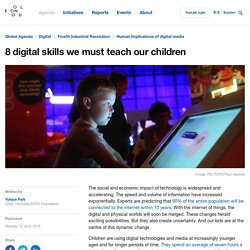
The speed and volume of information have increased exponentially. Experts are predicting that 90% of the entire population will be connected to the internet within 10 years. With the internet of things, the digital and physical worlds will soon be merged. These changes herald exciting possibilities. But they also create uncertainty. Your browser isn't supported. A Critical Review of Frameworks for Digital Literacy: Beyond the Flashy, Flimsy and Faddish – Part 1 – ASCILITE TELall Blog. By Professor Mark Brown, National Institute for Digital Learning, Dublin City University The simple fact is that digital literacy is now essential for successfully living, learning and working in today’s increasingly digitalized society and knowledge economy.
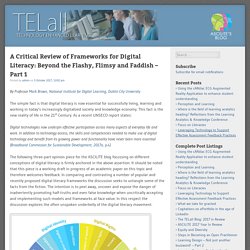
This fact is the new reality of life in the 21st Century. As a recent UNSECO report states: Is digital upskilling the next generation our ‘pipeline to prosperity’? - Huw C. Davies, Rebecca Eynon, 2018. Online copyright infringement tracker survey (8th Wave) Transversal skills. ATS2020 project has developed a transversal skills framework intended for school experimentation.
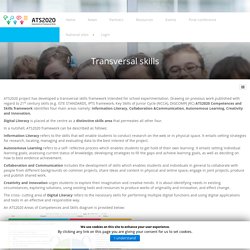
Drawing on previous work published with regard to 21st century skills (e.g. ISTE STANDARDS, IPTS framework, Key Skills of Junior Cycle (NCCA), DIGCOMP( JRC) ATS2020 Competences and Skills framework identifies four main areas namely: Information Literacy, Collaboration &Communication, Autonomous Learning, Creativity and Innovation. Digital Literacy is placed at the centre as a distinctive skills area that permeates all other four. In a nutshell, ATS2020 framework can be described as follows: Information Literacy refers to the skills that will enable students to conduct research on the web or in physical space.
Amazon’s control over ebook sales data should upset everyone in publishing. It is a heartwarming story: In spite of the endless onslaught of digital content, American readers have collectively put down their screens and decided to embrace once more that beloved tactile rectangular prism that reminds us, with its weight at the bottom of our bags, of its immeasurable heft.
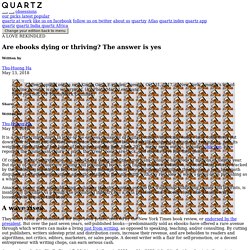
Since 2015, major news outlets, including this one, have reported the triumphant return of print: that “real” books are back, and ebooks have lost their gleam. Of course, it’s not entirely true. Yes, ebooks are doing just fine: Americans consume hundreds of millions of them a year. But many of their authors are writing and publishing books, and finding massive audiences, without being actively tracked by the publishing industry. In fact, the company through which they publish and distribute their books, a tech behemoth disguised as a benevolent, content-agnostic retailer, is the only entity with any real idea of what’s going on in publishing as a whole. A Critical Review of Frameworks for Digital Literacy: Beyond the Flashy, Flimsy and Faddish – Part 1 – ASCILITE TELall Blog. Education in the (Dis)Information Age - Hybrid Pedagogy. Copyright guidance from UK universities – UK Copyright Literacy. DigCompOrg Framework. The DigCompOrg framework has seven key elements and 15 sub-elements that are common to all education sectors.
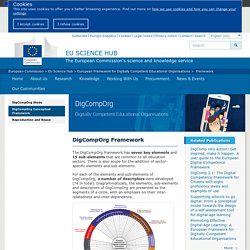
Lancaster University's Digital Vision. There are many areas of the university already using Tableau to visualise data; many people have been trained to build Tableau visualisations and receive support from CIS as they develop their ideas.
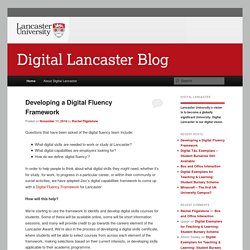
The use of Tableau continues to grow organically. The need for data visualisation cuts across many different initiatives of Digital Lancaster. Exploring Digital Literacies. Professor Mark Brown National Institute for Digital Learning Dublin City University Digital Literacy is essential for successfully living, learning and working in today’s increasingly digitalised and rapidly changing world.
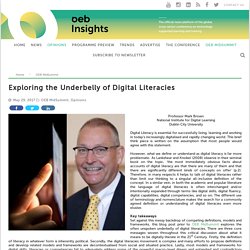
This brief think piece is written on the assumption that most people would agree with this statement. However, what we define or understand as digital literacy is far more problematic. Key takeaways. TPACK.ORG. New report shows digital skills are required in all types of jobs. The European Commission has just published the final report of the study "ICT for Work: Digital Skills in the Workplace" on the impact of information and communication technologies (ICT) on the transformation of jobs and skills.
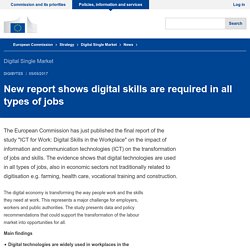
The evidence shows that digital technologies are used in all types of jobs, also in economic sectors not traditionally related to digitisation e.g. farming, health care, vocational training and construction. The digital economy is transforming the way people work and the skills they need at work. This represents a major challenge for employers, workers and public authorities. The study presents data and policy recommendations that could support the transformation of the labour market into opportunities for all. Main findings. The Google-phish-that-was-also-a-worm – what happened and what to do – Naked Security. Yesterday we wrote about a “Google Docs” phishing campaign that aimed to trick you into authorising a malicious third-party Gmail app so that it could take over your email account and your contact list for its own ends.
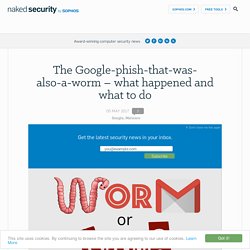
One of those ends seems to have been to spam out another wave of those same fraudulent emails to your friends and colleagues, in the hope of getting them to authorise the imposter app, and thus to send out another wave of emails, and another, and so on. Technically, that made it more than just a “phish”, which we’ll define very loosely here as an email that aims to trick, coerce or cajole you into performing an authentication task, or giving away personal data, that you later wish you hadn’t.
The classic old-school example of a phish is an email that tells you that you have lost money to fraud, or gained money from a tax refund, so please use this web link to login to your bank account to sort this out. An introductory guide to multimodality. Are you considering adopting a multimodal approach?
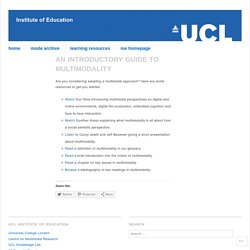
Here are some resources to get you started. Free High-Resolution Photos. For many academics, the web is just a means to an end: Shifting gears to solve the digital divide. The academic community faces a significant problem in staying up-to-date with new technologies. Often the easiest option for researchers is not to engage rather than trying a new way of working. Andy Tattersall looks at the lack of adoption of digital technologies and argues that in academia, the problem has often been a lack of translation: academics are advised how to use Twitter but rarely why. As a result tools are used sporadically, in silos and incorrectly. Internet On Our Own Terms. Teaching in a Digital Age Webinar Series. Five Interactive Webinars By Contact North | Contact Nord Research Associate Dr.
Tony Bates Starting in 2015, Contact North | Contact Nord Research Associate Dr. How to improve your privacy and security online. As a reader of Ars Technica and with Christmas fast approaching, that can only mean one thing: you'll be answering technical questions that your relatives have been saving since the last time you visited home. This year in addition to doing the regular hardware upgrades, virus scans, and printer troubleshooting, consider trying to advise the people in your life about better safeguarding their security and privacy.
Furthermore, in light of recent developments in the UK—the introduction of a new surveillance law, and the incoming Digital Economy Bill—there has never been a better time to refresh your own privacy and security safeguards. Keeping your data safe is one of the most important things you can do, and keeping your communications and browsing habits private can keep that data from being used to track your activities. Protecting your devices. The benefits to scholars of being on Twitter (essay) The benefits to scholars of being on Twitter (essay) Christopher Schaberg The Academic Advantages of Twitter August 2, 2016 - 3:00am Inside Higher Ed Technology Faculty, Technology. 173262 cidree yb 2015 halinen harmanen mattila. From Written to Digital: The New Literacy. Both the 21st-century economy and the careers needed to fuel it are changing at an unprecedented rate. Students must be prepared for nonlinear careers, pivoting to match the ever-changing work landscape.
Introducing tweetchats using #LTHEchat as an exemplar. UCISA Social Media Toolkit: a practical guide to achieving benefits and managing risks. Digital – Learning – Culture. Visitors and Residents is a simple way of describing the range of ways individuals can engage with the Web. Visitors and Residents. The Marshmallow Test for Grownups. Originally conducted by psychologist Walter Mischel in the late 1960s, the Stanford marshmallow test has become a touchstone of developmental psychology. #3 YouTube – Sharing is caring. Sue Beckingham: My Learning Journey: A Digital Narrative of the MELSIG event at NTU #melsigntu. 13 Ways Education Could Change In The Next 13 Years. 13 Ways Education Could Change In The Next 13 Years. Who are you and why should I follow you back on Twitter?
Why teachers need professional learning communities. **The Edvocate is pleased to publish guest posts as way to fuel important conversations surrounding P-20 education in America. The opinions contained within guest posts are those of the authors and do not necessarily reflect the official opinion of The Edvocate or Dr. One in ten adults have no IT experience. One in ten adults have no experience of using computers, according to a report published by the OECD last month. Untitled. Students can often take the easy way when generating a presentation, creating lists of bullet points from a source text, without thinking about the effectiveness (or not) of such approaches or how close they may be to plagiarism of the source.
The Critical Role Of Teachers In Transforming Education Systems. Don't mind the gap. Enhancing-presentations-for-the-multimedia-generation-home. Flipping the Institution: Higher Education on the Post Digital Age. Five reasons why you should 'do digital' Self-assessment: Understanding digital practices. Still-image-digitisation-home. Reimagining learning for a post-digital world (part 1) – Solutions not problems. UNESCO Global MIL Assessment Framework. Jisc digital capability codesign challenge blog. Hsiao-yun's known. Introduction to Archives: home page. Clued Up! Digital skills for the 21st Century Student. Curriculum change. The tech controversies of 2014 (and what we learned from them) Disruptive Innovation. Digital Learning Research Network (dLRN) Handbook. Ofcom: six-year-olds understand digital technology better than adults. Copyright. The A to Z of Social Media for Academia. The 7 characteristics of a digitally competent teacher.
Preschoolers Outsmart College Students In Figuring Out Gadgets. The Never Ending Thesis. Learning Literacies Framework. Well Versed. Developing digital literacies. Social Media for Busy People: 5 Tips to Speed Things Up. Developing digital literacies. Content Curation Through the SAMR Lens - Getting Smart by Susan Oxnevad - curate content, Flexible Tools, Innovation, multimedia, SAMR Model, Teaching, ThingLink.
Free Webinar - A Teacher's Guide to Backchannels and Informal Assessments. Exploring Curation as a core competency in digital and media literacy education. Research on academic blogging: what does it reveal? Staff ICT Skills Audit: sample. 10 keyboard shortcuts you probably didn't know. The CRAAP test - Evaluating Web Resources - LibGuides at North Carolina Agricultural & Technical State University.
How to use Twitter: the case for engagement. » Social media training resources produced by researchers at the University of Warwick The Sociological Imagination. Be Careful, Trolling Can Happen To Anyone. World Languages, Facebook, Pinterest, Culture & Literacy. DL staff development materials. 25 Tips For Successful Online Course Facilitation. Helping you take charge of your professional life. What is Creative Commons? (Infographic) Building a personal learning network.
Copyright in a Copy Paste World. Digital by Default Service Standard — Government Service Design Manual. What is a Personal Learning Network? Six compétences incontournables sur les médias sociaux. Why I had to unfollow you. 20 Top Video Explanations to Help Teachers Become Tech Savvy. Why Curation Will Transform Education and Learning: 10 Key Reasons. You have a Twitter account... now what? My summer paranoia: computers will replace teachers in higher education. Learning out and about with tech. Educators need Twitter!
50 Innovative Ways To Use Twitter More Effectively. How To Integrate Education Technology With Scaffolding. Learning, lurking and language teaching – An interview with Beyza Yilmaz « TESOL Greece Blog. Lessons from the past, lessons for the future: 20 years of CALL. Is CALL outdated?